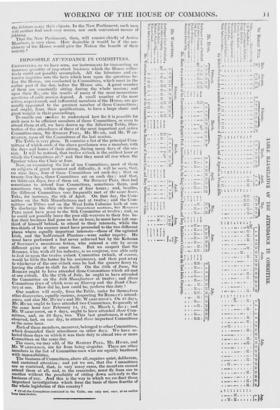IMPOSSIBLE ATTENDANCE IN COMMITTEES.
COMMITTEES, as we have seen, are instruments for transacting an immense quantity of imprtant business which the House collee- . tively could not possibly accomplish. All the laborious and ex- tensive inquiries into the facts which bear upon the questions be- fore the House, are conducted in Committees, which meet in the earlier part of the day, before the House sits. A great number of them are constantly sitting during the whole session; and upon their Re; arts the results of many of the most momentous questions of each session depend. A small number of the most active, experienced, and influential members of the House, are ge- nerally appointed to the greatest number of those Committees; and ought, from their qualifications, to have a large share and great weight in their proceedings. To enable our readers to understand. how far it is possible for such men to be efficient members of those Committees, or even to attend them at all, we have drawn up the following Table, illus- trative of the attendance of three of the most important and active Committee-men, Sir ROBERT PEEL, Mr. HUME, and. Mr. WAR- EuRToN, upon all the Committees of the last session.
The Table is very plain. It contains a list of the principal Com- mittees of which each of the above gentlemen was a member, with the days and hours of their sitting, during many days of the ses- sion. It will be noticed, that twelve o'clock is the earliest hour at which the Committees sit ;* and that they must all rise when the Speaker takes the Chair at four.
Now, on examining the list of ten Committees, most of them on subjects of' great moment and difficulty, it will be seen, that, on nine days, four of these Committees sat each day ; that on twenty-five days, three Committees sat on each day ; and that, on thirty-six days, two of them sat. Sir ROBERT PEEL thus had sometimes to attend four Committees, sometimes three, and sometimes two, within the space of four hours ; and, besides, the different Committees very frequently met at the seine hour. Take, for instance, the 6th of April. On that day, the Com- mittee on the Silk Manufactures met at twelve ; and the Com- mittees on Tithes and on the West India Colonies both at one. To discharge his duty on those i auportarit matters, Sir RAI-CERT PEEL must have gone to the Silk Committee at twelve ; and, as he could not possibly leave the poor silk-weavers to their fate be- fore their business had gone on for an hour, he must have left one- third of himself behind, to attend to their interests, while the two-thirds of his essence must have proceeded to the two different places where equally important interests—those of the agitated Irish, and the half-ruined Planters—were under inquiry. He must have performed a feat never achieved but by the Kehama of SOUTHEY S monstrous fiction, who entered a city by seven different gates at the same time. But we suspect that Sir ROBERT, who, with all his industry, is no conjuror, was able only to look in upon the twelve o'clock Committee (which, of course, would be little the better for his assistance), and then post away to whichever of the one o'clock ones he had the greater fancy to, leaving the other to shift for itself. On the 28th of June, Sir ROBERT ought to have attended three Committees which all met at one o'clock. On the 27th of July, he ought to have attended the Committee on the Silk Manufacture at twelve; and three Committees (two of which were on Slavery and the Bank Char- ter) at one. How did he, how could he, perform this duty ?
Our readers will easily, from the Table, make for themselves other discoveries, equally curious, respecting Sir ROBERT'S attend- ances, and also Mr. HUME'S and Mr. WARBURTON'S. On 43 days, Mr. Hums ought to have attended two Committees, frequently at the same hour (see February 14, 21, 28, March 1, &c.) ; and Mr. WAantraroN, on 8 days, ought to have attended three Com- mittees, and, on 20 days, two. This last gentleman, it will be observed, had, on one day, to attend three important Committees at the same hour.
Each of these members, moreover, belonged to other Committees, which demanded their attendance on other days. We have se- lected those days on which it was their duty to attend two or more Committees on the same day. • The cases, we may add, of Sir RorikaT PEEL, Mr. Holm, and Mr. 'WARBURTON, are far from being singular. There are other members in the list of Committee-men who are equally burdened with impossibilities. The business of Committees, above all,requires quiet, deliberate, and sustained attention ; and yet we see, that the Committees are so contrived, that, in very many cases, the members cannot attend them at all, and, in the remainder, must fly from one to another without the possibility of sitting down seriously to the business of any. And this is the way in which we corduct those important investigations which form the basis of three fourths of the whole legislation of this country!
• Of all the Committees contained in the Table, one only met, once, at an earlier 3iour than twelve.


















































 Previous page
Previous page